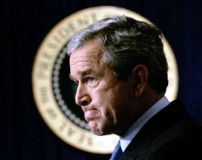Unruly allies trap US in foreign policy bind
By Guy Dinmore, Financial Times
May 24, 2005 — President George W. Bush is faced with a serious foreign policy dilemma when it comes to some of America’s allies in its “global war on terror”. Having promised repeatedly that the US will no longer tolerate authoritarian regimes, which way can he turn when faced with human rights violations of the magnitude seen last week in Uzbekistan and, before that, in Sudan?
 Although the Bush administration has condemned the indiscriminate use of force deployed by President Islam Karimov of Uzbekistan against civilian demonstrators, and accused Sudan’s government of responsibility for genocide in the western region of Darfur, both countries remain important partners in the war on terrorism.
Although the Bush administration has condemned the indiscriminate use of force deployed by President Islam Karimov of Uzbekistan against civilian demonstrators, and accused Sudan’s government of responsibility for genocide in the western region of Darfur, both countries remain important partners in the war on terrorism.
Critics say that while the US is bringing some pressure to bear, it has not come to grips with accountability for its allies, particularly in relation to its confused attitude towards the International Criminal Court (ICC).
Condoleezza Rice, the secretary of state, highlighted the gap between reality and rhetoric last week when asked about Uzbekistan’s authoritarian regime: “We have good relations with some that we believe need to do more on the democratic front, and we have not so good relations with some that we believe need to do more on the democratic front.”
Human rights remained an issue, she added. The US had told Uzbekistan “in no uncertain terms” that it was time to reform. Last year Congress obliged the administration to withhold $11m (?8.8m, £6m) in aid because of Uzbekistan’s lack of progress.
Last Wednesday, as reports emerged of hundreds killed in Uzbekistan’s eastern Ferghana region, Mr Bush delivered a speech on his theme of spreading democracy. He named several countries where authoritarian governments had been removed but he chose not to mention Uzbekistan.
The Pentagon and intelligence agencies have had the whip hand in determining policy on allies such as Sudan and Uzbekistan. Donald Rumsfeld, the defence secretary, and Gen Richard Myers, the chairman of the joint chiefs of staff, are regular visitors to Uzbekistan, which provided an important airbase for the US to retaliate against al-Qaeda in Afghanistan after the attacks of September 2001.
Mutual interests have been served by US forces targeting Uzbek Islamists who have used Afghanistan as a base against Mr Karimov. And last August Gen Myers announced an extra $21m to help it remove its stockpile of biological weapons, saying the strategic relationship was “maturing very nicely”.
That was in spite of growing concern over Mr Karimov’s treatment of opponents, particularly the case of a man boiled to death in detention. His mother was subsequently jailed for objecting.
Asked about human rights, Gen Myers replied: “In my view we shouldn’t let any single issue drive a relationship with any single country. It doesn’t seem to be good policy to me.”
Craig Murray, the former UK ambassador to Uzbekistan, resigned after protesting against UK and US policies there. He says the CIA held foreign terrorism suspects in Uzbekistan.
Martha Brill Olcott, a Carnegie Endowment analyst, says Uzbekistan is at a “tipping point”, with unrest driven by social and political discontent. But she says the US has little leverage and there is no clear alternative to Mr Karimov’s regime. The immediate danger is a slide into civil war, as in Tajikistan in the early 1990s.
The fear of a failed state is also what haunts US policymakers on Sudan. If the US were to isolate Khartoum, then Africa’s largest country might regress to what it was in the mid-90s: a home and transit point for extremists such as al-Qaeda and Osama bin Laden, who left Sudan for Afghanistan in 1996.
Sudan’s past associations with such groups and its willingness, under pressure, to disavow them, makes it an attractive ally. The CIA has a big station in Khartoum and uses Sudanese intelligence resources in the Horn of Africa. Given the extent of the atrocities in Darfur, senior US officials are unwilling to go on the record about their happiness with intelligence co-operation in Sudan. Among their contacts there are likely to be those accused of war crimes: Kofi Annan, the UN secretary-general, handed a sealed list of 51 names to the ICC last month.
Still, the officials say co-operation is “excellent”. A State Department report said the counter-terrorism relationship with Sudan continued to improve in 2004.
Despite its entrenched opposition to the ICC, Washington abstained rather than vetoed a UN Security Council resolution referring the case of Darfur to the court. Abstention, a senior State Department official said, was a way to put pressure on Sudan over Darfur. “It really rattled them,” he said.
Nonetheless, the US has issued contradictory signals on whether it would support an ICC investigation. Anne Patterson, acting US envoy to the UN, said after the March 31 vote that US legislation prevented it “from providing assistance and support” to the ICC.
The next day Nicholas Burns, undersecretary of state, said Ms Rice “felt very strongly” that the US should join the international community to see justice done in Sudan and that those guilty of war crimes be tried before an international court. Heather Hamilton, an act-ivist with Citizens for Global Solutions, which supports the ICC, says that in the case of Darfur there is the possibility of the US becoming a haven for war crimes suspects wanted by the court.
